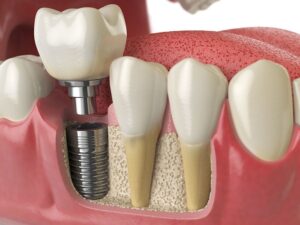Dental implants are the ideal tooth replacement solution. These fixed appliances can replace one, several, or an entire arch of missing teeth, depending on the patient’s unique oral health needs following tooth loss.
But not all patients can qualify for this treatment. And in rare circumstances, an implant might fail. This occurs when the implant does not fit properly or becomes infected, requiring its prompt removal from the patient’s mouth.
You can take action to protect your new dental implants, though the device’s failure will be unlikely. Read on to learn more about the causes as well as the prevention of dental implant failure.

What Causes Dental Implant Failure?
A dental implant relies on a titanium post anchor placed in the patient’s jaw to support prosthetic teeth. The initial surgery to put this anchor into the jaw will involve several months of recovery. During this time, the anchor fuses with the jawbone to create a lasting, durable, permanent foundation for the implant.
Then the dentist will attach the dental prosthetics to these anchors. You will need to follow aftercare guidelines from your dentist in order for the healing and fusion processes to occur without issue.
Otherwise, the implant might feel loose in your mouth, or the prosthetics might wobble. This indicates implant failure because they do not fit securely in the bone as they should. Large amounts of swelling or bleeding after your treatment also point to this issue.
If you notice severe pain that does not respond to your dentist’s management advice, this also could be dental implant failure. Do not wait to contact your dentist about these symptoms or you could suffer damage to surrounding teeth or the rest of your mouth.
How Can I Prevent a Failing Dental Implant?
A dentist will evaluate your oral health and dental structure to ensure you are a good candidate for implant dentistry prior to initiating this treatment. They will check that you have enough stable jawbone and gum tissue to sustain the implant fixture. If not, they might suggest a bone graft or other solution to build structure to the jaw.
These efforts ensure you have a very low risk of dental implant failure. But to further reduce the chances of this incident, adhere to your dentist’s aftercare advice. This will involve keeping the surgical sites and the rest of your mouth clean without irritating the implants.
Practice good but careful oral hygiene before, during, and after receiving your implants. Gum disease, tooth decay, and other dental problems could alter your mouth which will, in turn, affect the fit of your implants.
Brush your teeth at least twice a day, floss daily, and visit your dentist for routine teeth cleanings to promote proper oral hygiene. Dental implants will not require additional maintenance. But you should stick to good oral habits to get the most out of these oral appliances. Learn more by scheduling a consult with your dentist or dental implant specialist today.
